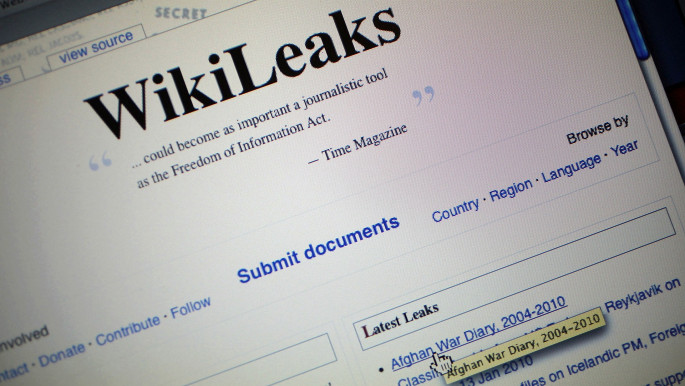Julian Assange arrest warrant upheld
It was 2010 when Julian Assange - an intense-looking platinum blonde Australian former hacker - was thrust into the limelight.
His whistle-blowing website, Wikileaks, had just released the greatest leak in the history of the US military.
The internet was suddenly deluged with the release of hundreds of thousands of classified documents about the war in Afghanistan and Iraq. Among the files, the now infamous footage of US soldiers shooting dead 18 civilians from a helicopter in Iraq.
The Wikileaks database covered events from the Iraq War from 2004 to 2009, with the most of the entries classified "secret".
The Pentagon says the leak endangered national security, as well as the lives of soldiers and civilians. Julian Assange has always defended the leaks and the work of his website, describing it as "a giant library of the world's most persecuted documents".
"We give asylum to these documents, we analyse them, we promote them and we obtain more," Assange once told Der Spiegel.
I visited the James Bond-style nuclear-proof bunker in Stockholm where Wikileaks stores its digital secrets. Perhaps ironically, Wikileaks has found a safe haven for its website here in Sweden, the same country that wants to extradite its founder to question him on allegations of rape.
This is why Assange has been living in the Ecuadorian Embassy in London since June 2012. He was granted political asylum there after running out of legal options against his extradition.
He fears the US will extradite him from Sweden if he leaves his embassy haven. He would also probably face arrest by the UK for breaking his bail conditions.
However, his campaign for freedom received another blow on Friday after another a court in Sweden rejected his appeal against the extradition order.
 |
|
| Assange's lawyers accuse Sweden of capitulating to US pressure [Getty] |
The court ruled that it "shares the assessment of the District Court that there is still a risk that Julian Assange will flee or otherwise evade legal proceedings or a penalty".
It added: "His stay, as such, is not to be regarded as an unlawful deprivation of liberty and shall not be given any importance in its own right in the assessment of proportionality."
Assange's Swedish lawyer, Per Samulesson, told The New Arab that he would appeal the decision.
"We are disappointed that once again the Swedish courts continue to refuse to acknowledge the whole situation. Julian Assange is under pre-investigation in US and has been in fact granted political asylum."
The Americans have not issued an arrest warrant for Assange, but his lawyer Melinda Taylor says it is "not a matter of if, but when".
She says that the US State Department has launched an investigation into Wikileaks activities, and has asked Google to hand over any emails on their servers.
"There is no point investigating if it wasn't to secure his presence - they wouldn't invest those resources."
Assange's team have previously insinuated that the allegations in Sweden are politically linked. When I spoke to Claes Borgstrom, the lawyer for the two women who have accused Assange, he denied any "dark forces" behind the allegations.
It was, he said, "an ordinary case of sexual abuse".
 |
In the past Assange's team have insinuated that the allegations in Sweden are politically linked |  |
Earlier this year the United Nations Working Group on Arbitary Detention found that "Julian Assange has been arbitrarily detained by Sweden and the United Kingdom since his arrest in London on 7 December 2010, as a result of the legal action against him by both governments".
In a public statement, the expert panel called on the Swedish and British authorities to "end Mr Assange's deprivation of liberty, respect his physical integrity and freedom of movement, and afford him the right to compensation".
However, the British government rejected the findings.
"This changes nothing," a government spokesperson said at the time. "We completely reject any claim that Julian Assange is a victim of arbitrary detention. The UK has already made clear to the UN that we will formally contest the working group's opinion."
In a statement to The New Arab, Julian Assange's legal team accused Sweden of capitulating to pressure from the US.
"Today's domestic decision shows that Sweden is not yet prepared to abide by its international obligations under the ICCPR and CAT and to the UN.
"Sadly, Sweden has a long history of compromising its rule of law where the perceived interests of the United States are concerned, from helping the CIA kidnap people in Sweden, as in the cases of Agiza and al-Zery, to its 100 percent US extradition rate over the last 15 years.
"Mr Assange will appeal the decision and remains confident that his indefinite and unlawful detention will cease and that those responsible will be brought to justice."
Wikileaks says it is concerned about the deterioration of Assange's mental health the longer he stays confined.
According to his lawyer, the next step could be for Swedish investigators to question Julian Assange at the embassy in October. It is unclear whether that will happen.
To add to the drama, despite Assange's "house arrest", Wikileaks has continued to release documents which are making the headlines and influencing world events.
Last month, it was criticised for publishing the sensitive personal data of hundreds of ordinary people, including the name of a Saudi citizen arrested for being gay. It also recently put out a stack of US Democratic party emails in July showing how party chiefs tried to undermine US presidential candidate Bernie Sanders.
Nazanine Moshiri is a freelance journalist and security expert based in Tunis. You can follow her on Twitter @nazaninemoshiri.



